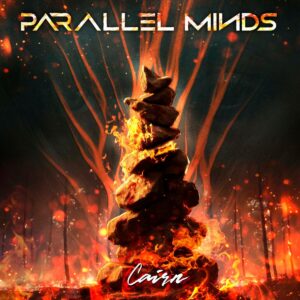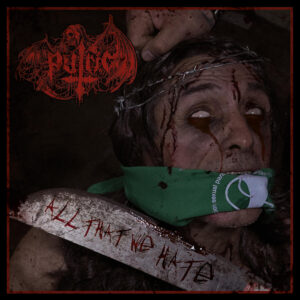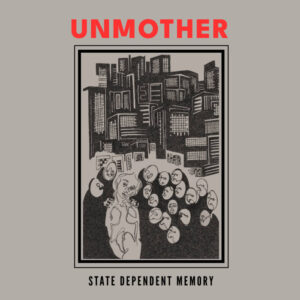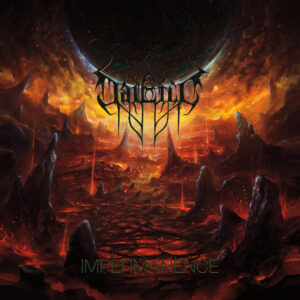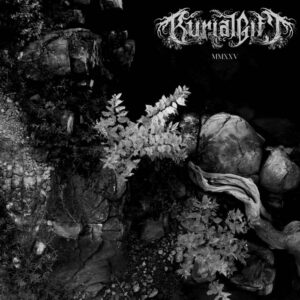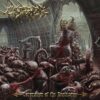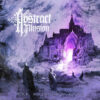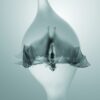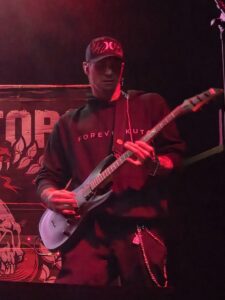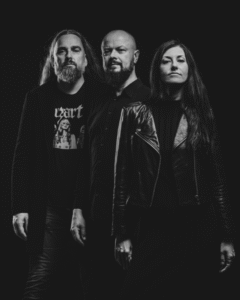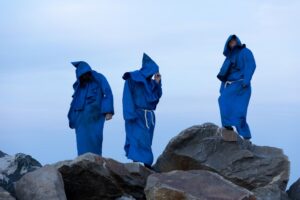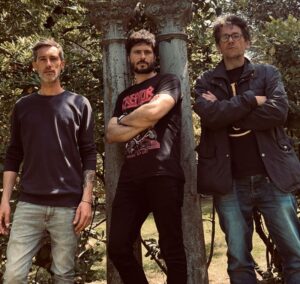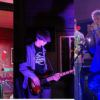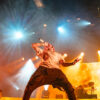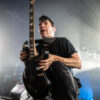The HiFi venue is one of the Sydney scene's biggest bugbears. It seems that show after show is characterised by a battle between bands and their fans, and the forces of the venue. Firstly is the location. Usually it takes a train and a bus to get to the HiFi, if you're unwilling to give up your right to get tanked during a Heavy Metal show, but the entertainment quarter, located in one of Sydney trains' aggravating blind spots means that after a show you're going to be hard pressed getting back Central before trains stop. Secondly, the prime position in the 'entertainment' quarter comes with a prime pricing on food and drinks. Thirdly is the ever enthusiastic security, who clamped down on any sort of moshing when
KREATOR and
TANKARD came down to thrash, rendering the room either motionless or empty. And finally, the issues with sound never cease to rear their heads at the HiFi, which consistently fails to pull off a show without feedback or balance issues, let alone producing a great sound for bands.
I had a chat with the sound technician after the show. One of the difficulties in mixing at the HiFi is with the acoustics. Apparently the shape of the room, as well as the upper balcony make the HiFi a difficult venue in which to pull sound, particularly for a metal gig. Also, fate conspired in such a way that the opening two acts didn't get a chance to do a sound check, and considering the diversity of the three groups: TABERAH: two guitars, bass, drums, vox; DIVINE ASCENDANCY: one guitar, bass, vox, drums, keys; BLIND GUARDIAN: Four vox, two guitars, bass, drums, keys, the technician definitely had a tall order to fill.
So, having walked to the entertainment quarter from Wynyard station - cheers for the trackwork Cityrail - and paying $30 for a modest burger and a beer, we settled in to see how the titanic BLIND GUARDIAN would fare in their battle against the venue.
TABERAH, Tasmanian Trad Metal lineup opens the show with "Bohemian Rhapsody" to segue into their own material. Perhaps this bold introduction sets the tone for the rest of their set: TABERAH's music is unabashedly nostalgic, calling backwards to the time where Heavy Metal reigned supreme, and focussing their musical chops into creating that early metal sound in a way which doesn't strike as particularly innovative.
It's not all about being the latest thing however, as the audience clearly thinks: the band's performance is incredibly tight and precise, with callouts and cheers taken up by an enthusiastic crowd. Solid performance, and front man Jonathon Barwick's banter, whilst occasionally cocky, has its own hamfisted charm: "We're going to drink all the beer in Sydney!" shouts Barwick towards the end of the set, and one can't help but smile a little. There's always a place for us to remember our roots.
DIVINE ASCENDANCY, the Progressive Metal (perhaps read: Symphonic Metal) act from Melbourne takes the stage afterwards. With a sound that immediately resounds with symphonic acts such as NIGHTWISH, they open their set to more of the sound issues that plagued TABERAH; pulling a single guitar sound from a dual guitar mix and attempting to pan it proves one of the key tasks for the set. Whilst the rhythm section seem on a tight lead - melody is strictly parcelled to vocalist and keys - it is always a pleasure to watch bassist Jason Meracis play with an enthusiasm and fluency which seems overshadows the rest of the group.
Constantly moving and hammering his base, and with a grin which cannot be suppressed, the only thing perhaps that could pull the eyes away are the light-up tubing on vocalist Jennifer Borg's outfit. In the context of Andre Olbrich's guitar playing, solos remain somewhat underwhelming, and Borg doesn't quite muster the crowd support that Barwick managed to create - it is a bit odd to see her leave the stage so many times over a relatively short set. Divine Ascendency's set doesn't quite have the teeth to get the blood pounding, or the character to still a crowd. Perhaps the band might consider taking a leaf out of Meracis' book, share around the melody lines and put a few high-octane pieces in their kit.
By now the crowd is insatiable. Having stood in a line several hundred metres long, been in the venue for two hours, they are chomping at the bit. A cry erupts from the crowd "Guardian! Guardian! Guardian!" In the dimness of hazy blue light, we hear the choirs of Budapest, Boston and Prague. Bass and tenor sonorities wash the crowd. The upper voices join the insistent snare and the orchestral layers build to the screams of legion fans. Ascend to the stage Frederik Ehmke, Barend Courbois, Marcus Siepen, Andre Olbrich. Finally Hansi Kursch, microphone in hand, the other with two fingers, as if to offer benediction to those before him: "As dark night embraces". Stepping into the shoes of the dictatorial power of the piece, the crescendo is consuming before finally the band throws us into the churning depths of "The Ninth Wave".
Depositing us out the other side, Hansi greets the crowd with charisma built from a thirty year music career. After confiding the exhaustion of the tour with the punters, he snuffs out a punter fairly rapidly: "Save your voice, we'll need it later." And with that, Banished From Sanctuary is blasted over the crowd. The crowd's enthusiasm is an endless energy that refuses even Hansi. "We will now play a sad, sad song." He says, but struggles to keep himself from smiling when a punter responds "Fuck yeah! Sad song!". "This next song," he begins "is a waltz." And we are lowered into the plight of Middle Earth, where we throw our voices into the lament of "Nightfall". We blitz through "Fly"; Hansi merely has to gesture for the crowd to clap along to the choruses, followed by "Tanelorn" and "Prophecies", each eliciting more and more from the enthused punters.
For the next song, Hansi challenges the crowd: this is the "Last Candle", where the onus is on the crowd to provide the strength to the choral lines, and as the band fades out, the crowd divides into two: "I feel there is somebody!" "Somebody's out there!" To the power of Frederik's drumming, who has been singing every song so far and appears with a fiendish strength, the crowd sustains the chant, keeping alive with their voices the hope which the song centres around. Hansi slams a heckler, security removes someone throwing punches. "Miracle Machine" before we launch into "Bright Eyes", where Andre, standing as a spectre on stage, plays his solo with obvious relish, fingers tracing out patterns on the fretboard that have been etched into his mind over years. "Guardian of the Blind" follows, and finally "And then there was Silence". The fifteen minute epic brings out the best in everyone, and although few of those singing know the lyrics to the phrase at the end, the crowd nevertheless pitches in, and we have a chorus of 'la's' and 'lai's', coupled with ecstatic bouncing.
At this point, Hansi announces that they are finished, but only a minute after they have left the stage, Arabesque augmented seconds and eastern drums float across the stage like a dry desert wind with a winding violin. Explosion! "NOW THERE IS NO END!" and we are thrown into the tumultuous and enormous "Wheel of Time". Twilight of the Gods" follows, but, as Hansi says, in order to slay the gods, one must knock on the doors of "Valhalla". The crowd refuses to let this piece finished, "Valhalla, Deliverance. Why've you ever forgotten me?" they sing, as if to the band themselves: they will not be forgotten, neither the band nor the audience, and in response, Frederik throws his weight in on the kit.
Here comes the moment in every BLIND GUARDIAN show which touches the hearts of all present. It is the mark of the musical to be able to take a crowd of metalheads, discard their electric instruments and play that bittersweet ballad. This isn't a moment of vicarious living, a moment where fans are invited to be something they are not, this is not an affectation of sadness. "The Bard's Song" is a gesture of solidarity, a deep reflection, and invitation. "Tomorrow they'll take us away, far from home, no one will ever know our names. But the bard's songs will remain." The world may strip our dignity, it may force us to bended knee, it may remove us, shake us, drive us away from our homes and crush us away into anonymity, but that central spirit, music, stories and memories, cannot be consigned to the archive of time. It is a song which says to us, that even though one day we will be dust, we now are masters of our stories, and we are the ones who create what is meaningful: we are not reduced to the nothingness with which the enormous world would see us.
They finish with
"Mirror Mirror", the choruses now softer than before: we have been singing together for two hours now, and few people have any stamina left, but the pit grows to its largest here, and all tap into their second wind to throw themselves into the fray.
An experience of
BLIND GUARDIAN is very difficult to convey. It was a show that will remain in my list of stories to tell at a local gig, to friends and family. My brother and I sit at our job in a bookshop the next day, waiting for customers to leave so we can blast out our favourites from the night before. My Facebook feed is on fire with all the people discussing the show. Whenever one of us walks past the fantasy section, we both sing
"Wheel of Time!" in cracked and hoarse voices.
Thank you for the show, Blind Guardian. Until next time.
